
Grow from $1 Million to $100 Million
Explore our collection of resources filled with actionable strategies, expert insights and everything you need to increase ecommerce sales.

Consumer Behavior Trends: How Brand Values Impact Customer Loyalty


Consumer Behavior Trends: How Brand Values Impact Customer Loyalty
Get The Print Version
Tired of scrolling? Download a PDF version for easier offline reading and sharing with coworkers.
A link to download the PDF will arrive in your inbox shortly.
With roughly nine million ecommerce retailers in the world (and 2.5 million in the U.S. alone), staying competitive requires more than simply offering a good product.
As customers decide which brands are worthy of their purchase decision, online retailers must be able to capture their audience on a much deeper level — and it all starts with brand values.
What are Brand Values?
Brand values are the foundational beliefs and ideals that a company stands for. These values communicate what is truly important to the company and guide all of its operations, including where and how they source their products, how employees are treated and how they deliver their products to customers.
As an ecommerce business, establishing brand values is crucial for communicating who you are as a business, what you care about and how you carry out your mission. And in a sea of ecommerce businesses, these values are your secret weapon for turning one-time visitors into loyal customers.
How Do Brand Values Impact Trust and Loyalty?
With ecommerce experiencing massive growth and transformation, BigCommerce wanted to understand what factors are influencing the ways consumers shop online.
So in our Global Consumer Report, our team surveyed over 4,000 online shoppers in the US, UK, Italy, France and Australia to help uncover the top trends shaping retail today and in the future — and, of course, brand values were top-of-mind.
Specifically, BigCommerce wanted to uncover how merchants can build trust and speak to the values of today’s shoppers.
Here’s what we found:
Consumers have a greater affinity for brands that are honest and transparent.
With an infinite number of brands to choose from, today’s online shoppers need more than just a good product to gain their trust. Any brand can offer a high-quality product, but the true standout brands are the ones that connect with their customers on a much deeper level — by authentically expressing themselves through their brand values.
According to a survey by Google and the U.S. Black Chambers, Inc., 22% of consumers say they like to learn about the identity of the owner before supporting a business. This proves that shoppers care about more than just what they see on the surface. They want to know what your brand stands both in the spotlight and behind-the-scenes.
But while we knew that shoppers are seeking brand transparency, BigCommerce wanted a better understanding of the types of information customers are looking for.
What brand values influence purchase decisions?
When asked which brand values would make customers most and least willing to purchase from a brand, the results ranked as follows:
Honesty and transparency about activities and the impact they have on the planet and society (e.g., packaging, cruelty-free, etc.).
Fair employee wages and benefits (e.g. healthcare benefits, time off, etc.).
Long-term, ambitious strategies designed to leave the world in a better state (e.g. corporate giving, promote volunteering and donations, etc.).
Investing in brands and/or creating products with a strong social impact (e.g. black-owned businesses, B-corps, social enterprises, etc.).
Asking for feedback from customers on what they can do better and share how they follow through on delivering those commitments.
Taking a bold stance on political issues instead of avoiding tough topics.
According to our results, shoppers meaningfully resonate with brand honesty, transparency and fair employee wages and benefits. This is especially true for consumers in a higher income bracket, as we found that providing fair employee wages and benefits scales positively as income increases.
Clearly, customers want to support brands that support others. This reveals a major opportunity for ecommerce brands to focus their efforts not just on their products and services, but also on their communities, their employees and the planet.
Most consumers want to buy from brands that prioritize sustainability.
Undoubtedly, one of the top brand values that customers seek out is sustainability.
According to the UN World Commission on Environment and Development, “Sustainable development is development that meets the needs of the present without compromising the ability of future generations to meet their own needs.” For ecommerce brands, this means conducting business activities in a way that conservatively and wisely uses natural resources in order to balance environment, equity and economy.
According to a survey by Statista on attitude toward brand sustainability, almost 89% of respondents said they expect brands to do more to reduce their carbon impact, and 82% said they want brands to prioritize people and planet over profit.
Thus, it’s no surprise Google Trends data shows that interest in topics related to sustainability has increased over the past five years.
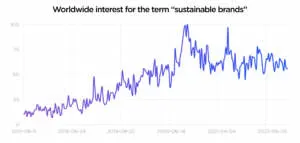
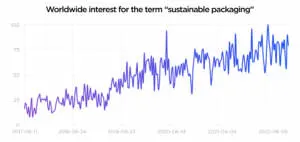
Similarly, in our Global Consumer Report, the majority of respondents rated sustainability as either very important (32%) or somewhat important (52%) when making a purchasing decision.
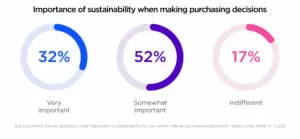
Gen Z and those with higher incomes care the most about sustainability.
However, our survey also found that sustainability holds different weight for consumers, depending on age and income.
Overall, our data shows that Gen Zers are most likely to consider sustainability a very important purchasing decision factor, while Baby Boomers are most likely to not consider sustainability at all when making purchasing decisions. Only 8.5% of Gen Z consumers stated that they were indifferent about sustainability. Conversely, 27% of Baby Boomers were indifferent.
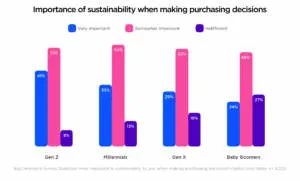
When it comes to consumer income, the same pattern holds true — as income rises, so does the importance of sustainability.
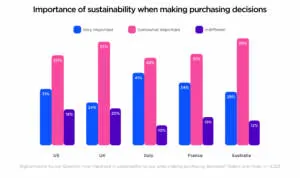
Thus, there is a huge opportunity for both luxury brands and those that target a younger demographic to gain a competitive advantage. By highlighting your sustainability efforts and remaining transparent, your business can engage new consumers and stay ahead of the pack.
How do consumers want to support sustainability efforts?
While it’s clear that consumers want to support sustainably-minded brands, our survey shows that consumers are more willing to support some sustainability efforts than others.
To gauge consumer willingness to support a brand’s sustainability initiatives, we presented our respondents with the following options:
Pay more for sustainably produced items.
Only have items delivered on specific days.
Adhere to stricter return policies.
Only pick up items in-store.
Pay an additional fee for “sustainability tax.”
Promote a sustainable brand to your friends.
The result? Consumers are overwhelmingly anti “sustainability tax.” Instead, consumers are most willing to sacrifice convenience by only having items delivered on a certain day or picking up items in-store.
This is unsurprising, considering the popularity of sustainability initiatives such as Amazon’s Amazon Day option and the rise in popularity of buy online, pick up in-store (BOPIS) during the pandemic.
Naturally, Baby Boomer respondents were more open to in-store pickup than Gen Zers, who were meaningfully open to paying more for sustainably produced products. Therefore, when deciding which sustainability efforts to promote, brands must first consider who their target audience is and which initiatives will have the greatest impact.
The Final Word
Needless to say, out of all the trends poised to transform the future of ecommerce, brand values are here to stay.
With millions of brands at their fingertips, today’s online shopper needs more persuasion than just a good product. Whether you’re passionate about sustainability, human rights or education, establishing brand values is an opportunity to humanize your business and build deeper connections with your customers.
For even more insights into personalization and other consumer shopping trends, check out BigCommerce’s Global Consumer Report.

Haylee is a Content Marketing Writer at BigCommerce, where she partners with the SEO team to craft narratives and blog content. She earned a B.A. in English Literature from the University of Texas at Austin and afterward spent a year abroad to pursue a Master's in International Management from Trinity College Dublin. When she’s not writing, you can usually find Haylee with her nose in a book, enjoying live music or scoping out the best local coffee shops.


